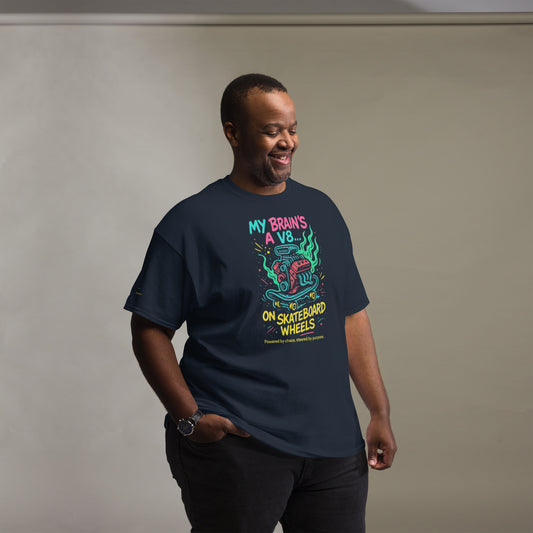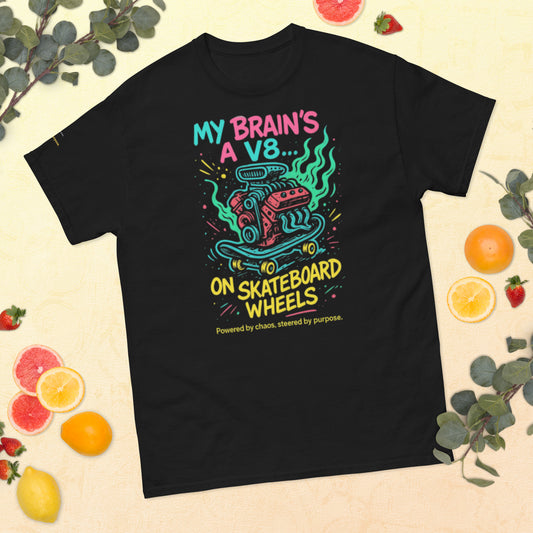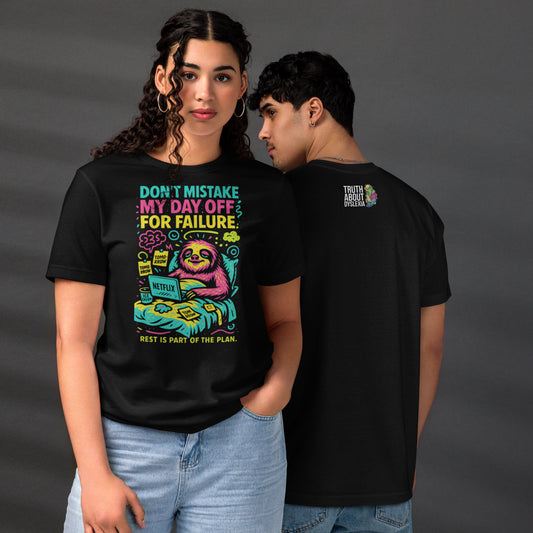
Dyslexia In Adults - Go Beyond Reading, Writing & Spelling.
Dyslexia, ADHD & The Real Truth About Life with a Right-Brained Brain. Join Stephen's Journey.

Hey I'm Stephen and welcome to the Truth About Dyslexia,
When I was diagnosed with dyslexia at age 10, (then ADHD at 33). No one told me what it really mean't.
They did not tell me about ADHD, Anxiety, Perfectionism, Overthinking, Autisim and so much more.
I was 32 when I learned what Dyslexia in Adults really was and what I could do to start impacting my life. To take control.
I started to learn the changes to my diet, the supplements I needed, the way my mind needed to be treated to work well.
To create the relationships I wanted, the business I wanted and life I had dreamed of.
I share my journey on the 'Truth About Dyslexia' podcast. Helping others like me not get left behind.
Dyslexia in adults does not get looked at enough. Many get a diagnosis and don't know what to do next.
My goal is to change that.
Don't worry you are here now and welcome to the next step in your journey.
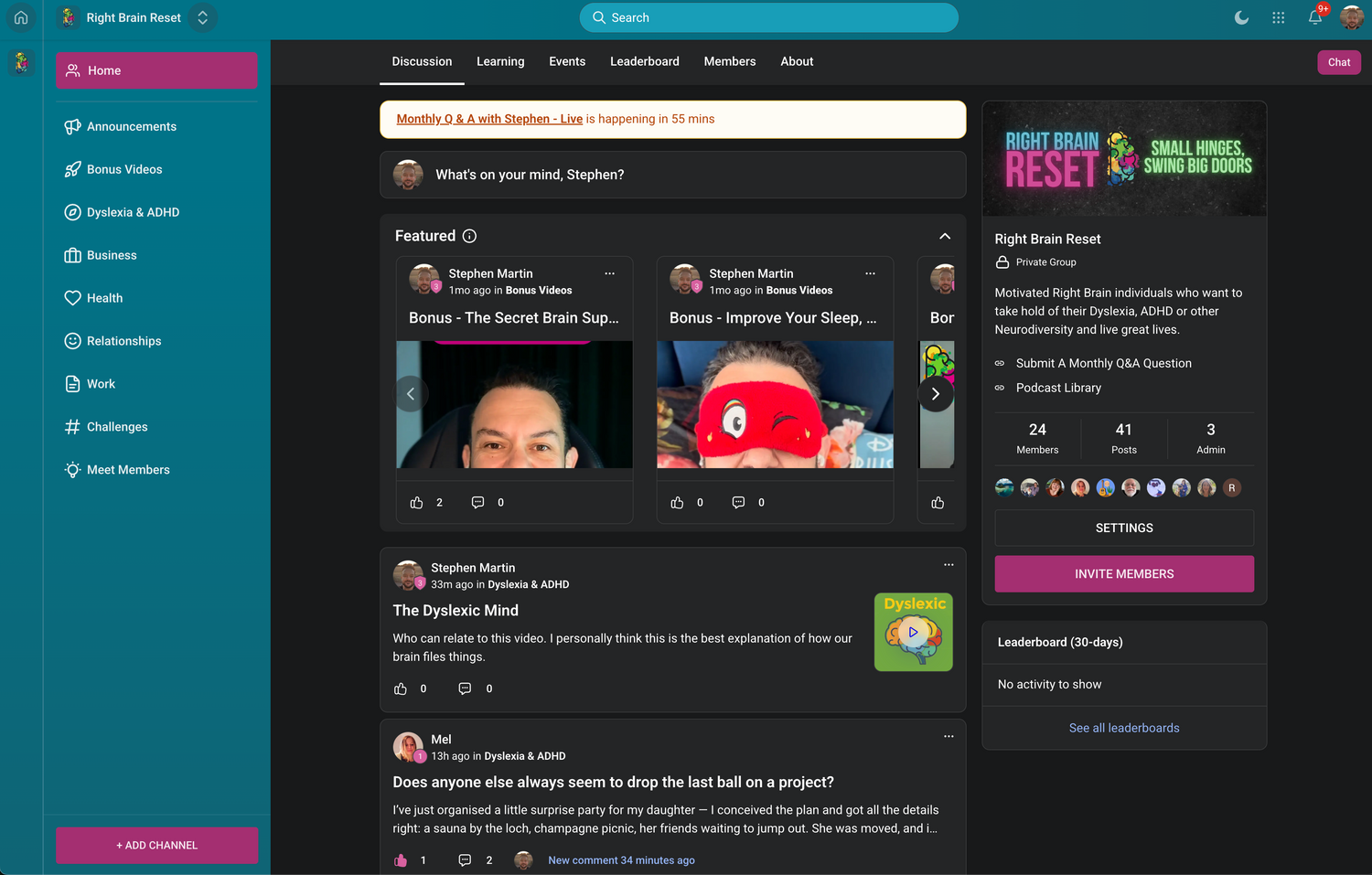
Join Your Community
Dyslexia as an adult can feel lonely. It did to me. But many of us want to succeed at life, work and relationships.
Join a commited group of awesome people here. Monthly Q&A webinars, mini courses and a place you can ask deep questions.
Dyslexia In Adults: What were about.
Some T-Shirt Ideas I Love
-
Calm on the Outside, Chaos on the Inside Unisex T-shirt
Regular price From $32.00 NZDRegular priceUnit price / per -
Emotionally Overclocked Always Unisex eco sweatshirt
Regular price From $85.00 NZDRegular priceUnit price / per -
Looks Lazy, Runs on Internal Mayhem
Regular price From $50.00 NZDRegular priceUnit price / per -
My Mind is a V8 Unisex classic tee
Regular price From $36.00 NZDRegular priceUnit price / per -
Rest Is Part Of The Plan Unisex Premium Sweatshirt
Regular price $52.00 NZDRegular priceUnit price / per -
Rest Mode: Activated
Regular price From $52.00 NZDRegular priceUnit price / per -
Right Siders Unisex Tank Top
Regular price From $44.00 NZDRegular priceUnit price / per
Blog posts
-

Help for Dyslexic Entrepreneurs: A Practical Gu...
Being a dyslexic entrepreneur is like playing business on hard mode with cheat codes you didn’t know you had. Some days you’re seeing the whole chessboard miles ahead. Other days...
Help for Dyslexic Entrepreneurs: A Practical Gu...
Being a dyslexic entrepreneur is like playing business on hard mode with cheat codes you didn’t know you had. Some days you’re seeing the whole chessboard miles ahead. Other days...
-
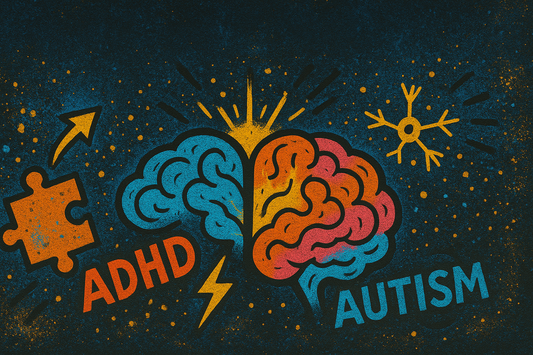
Maryland Scientists May Have Found a Big Clue A...
For years, doctors and parents have wondered why ADHD and autism seem to go hand in hand. Now, a group of researchers in Maryland may have uncovered one of the...
Maryland Scientists May Have Found a Big Clue A...
For years, doctors and parents have wondered why ADHD and autism seem to go hand in hand. Now, a group of researchers in Maryland may have uncovered one of the...
-
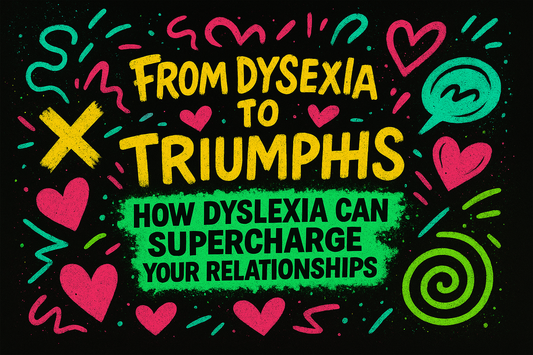
From Typos to Triumphs: How Dyslexia Can Superc...
Ever sent a message and watched it crash and burn? Me too. I’ve mixed up words, spiralled into tangents and turned a simple “good morning” into a confusing novella. If...
From Typos to Triumphs: How Dyslexia Can Superc...
Ever sent a message and watched it crash and burn? Me too. I’ve mixed up words, spiralled into tangents and turned a simple “good morning” into a confusing novella. If...

Dyslexia In Adults Can Hold You Back and It goes well beyond reading, writing and spelling.
Dyslexia In Adults
What does it actually mean & how does it show up?
Learn how dyslexic thinking effects more than just reading & writing (The Good, The Bad & The Interesting)
So much more than trouble with words!
If you’re an adult with dyslexia, you might assume that it’s all about reading, writing, and numbers.
That’s what many of us were told in school, right!!
However, that’s just a tiny fraction of the larger picture.
Dyslexia means that your brain prefers to think visually, like pictures and movies. Some people experience this more intensely than others.
Consequently, even simple tasks like reading an analogue clock or organising tasks can present unique challenges.
We won’t bore you with excessive words.
Instead, take a moment to explore our Adult Dyslexia Podcast, which has garnered over 830,000 downloads. It provides valuable insights into your dyslexic traits.
If you want more, show your support by liking us on Facebook and joining our private and secure adult dyslexia support group. We’re committed to sharing content within the community as much as possible.
A Little Bit of History & Clarity
The word dyslexia comes from two Greek words: dys (meaning bad, abnormal or difficult) and lexis (meaning word).
Definition.
“A developmental disorder which can cause learning difficulty in one or more areas of reading, writing, and numeracy. Nontechnical name: word blindness”.
This is a negative definition, referring only to the reading, writing and numeracy aspects of dyslexia.
This article will highlight what dyslexia is, and why it affects the way dyslexics view the world, process information, build their identity and learn life lessons.
Our knowledge about dyslexia in adults is fairly recent. The term was introduced in the 1960s to describe students with reading and literacy difficulties when there was no other apparent physical reason.
We work with Dyslexic Adults in the US, UK, Europe, Australia and all around the world. But we are based in New Zealand – The government only officially recognised dyslexia here in April 2007 – Stephen actually did a podcast with the founders of the Dyslexia Organisation over here!
There is still much to learn about this neurological condition. Until the advent of MRI scans, we could only study dyslexia by examining the brains of people known to be dyslexic after their death.
Often called a learning disability or a defect (which we do not agree with!), dyslexia is thought to only affect reading, words and numbers.
We live in a society that generally measures people’s intelligence by their literacy. These factors can lead dyslexics to have very negative school experiences and subsequently suffer from self-belief and self-confidence issues. As an adult looking back – imagine how many people told you that you had made a mistake in school – that is really challenging for a child and is carried with us as adults.
School compares students to each other and to the standard of society.
When we do not meet expectations, we become painfully aware of ourselves. We start believing we are not good enough and we cannot do things. It is very difficult for a dyslexic to watch others achieving tasks easily and not being able to do the same themselves, no matter how hard they try. This creates, stress, anxiety and feelings of worthlessness.
What causes dyslexia?
This question has not been answered categorically. **MRI scans show that dyslexics use a different part of their brain to process words when reading. It is commonly accepted that dyslexics are visual learners or kinaesthetic (hands-on) learners. Using the visual processing part of your brain affects much more than just reading. Visual thinkers/dyslexics need pictures to be able to understand concepts.
Dyslexics find it hard to understand or remember words, instructions, sequences or numbers. However visual thinking can actually be very effective. Ikea and Lego use pictures on ALL their instructions. It would take a huge amount of words to describe which way the pieces should go and how you should attach them. Instead, pictures explain it easily and quickly.
Talents of Adult Dyslexics
Adults with Dyslexia have a variety of talents (it’s not all bad). Two key traits include:
- Very fast thinking – “A picture says 1,000 words.” That is so true! If you are dyslexic, you think incredibly fast. You may not even see the image/s and end up stumbling over your words, unfinished sentences, or incoherent speech, as you try to capture and explain the images that are rapidly firing in your head. Time can seem slow for a visual thinker. Their internal thoughts are firing at 32 images per second while word thought is only 5 words per second. We do not perceive time the same way as non-dyslexic thinkers.
- Ability to view mental images from any perspective – Imagine an apple. Dyslexics can easily move that image around in their head, and view the apple from the top, side or underneath. Thanks to this ability, many dyslexics establish professions in building, engineering, architecture, design and art.
Visual thinking allows you to make connections that are not immediately obvious. Dyslexics do not naturally think in a linear sequence. Their thoughts grow organically and exponentially. This is a great talent for problem-solving or creating, but it could be a real handicap when having to organise time, prioritise, manage tasks, or stay focused on one task.
Dyslexia in adults is not something to ignore. Many think it disappears when you leave school - but people just don't know what it is. If teachers struggle to get it - bosses 100% do.
We run courses on Confidence and webinars for Dyslexics and you will learn that visual thinking can be the key to owning your future & removing anxiety (or at least some of it)
How do these talents affect an adult dyslexic in a negative way?
Words, spelling and reading are all sequential tasks. The alphabet starts at A and finishes at Z. You read a word from left to right. Maths problems follow a certain order. Dyslexics naturally do not think in a sequence.
Do you think about breathing? No, you just breathe. It is the same with visual thought. Dyslexics are not consciously thinking about their pictures, they do so naturally.
Words that do not have a picture or do not exist in the real world are another side of literacy difficulties. A dolphin, a cup, a tree, all these words are things that exist and have a form.
However, it, the, and as, are words that have no picture. They do not exist in the real world. If there is no picture, a dyslexic cannot understand or make sense of the word. The term blindness comes from this. They cannot see words in their mind that are not associated with pictures.
Challenges with reading and writing are only a few of the trials caused by dyslexia. People learn best through experience, which is the building block of our identity. Toddlers learn not to touch the fire because it is hot, by experiencing the heat. Not because we tell them it is hot.
Imagine using your picture thinking talent and experiencing the world differently. When you are doing something you love, time races by. When you are doing something you hate, time drags.
Why does it feel like this? The world does not speed up or slow down. Time moves at a constant speed. Yet all humans can relate to this analogy. Dyslexics often experience this. Part of the visual thinking talent is to be able to see the pictures in your head and use them as the basis for your experience and reality.
In your imagination? , time can go super fast, or super slow.
A picture thinker can easily visualise a treehouse, the pictures are so real you feel like you have been in the tree house, and climbed the tree to get to the tree house.
These pictures now become a memory (albeit it a false one). If someone asks if you have been in a tree house, you recall this visualisation/memory as the correct experience and draw from that.
However, using false experiences to recall information or make decisions, judge or learn from, could lead to problems. No one likes to get things wrong or to feel lost. When you cannot trust your own thoughts, you end up in a very uncertain place.
Was I really told those instructions? Why can’t I remember the paragraph I just read? I am sure I put my keys on the table this morning. If you were using your visual pictures, your perception may not be accurate. This constant uncertainty leads to anxiety and self-doubt.
Dyslexics create real memories from picture thoughts. Telling them their memory is incorrect would create anxiety, confusion and stress leading them to feel inadequate and different.
One of the goals of Truth About Dyslexia is to bring awareness to the hidden side of being dyslexic. We want to help talk about, explain and explore the uncertainty and anxiety that dyslexics can experience. There is much more to dyslexia than just a reading, writing and spelling difficulty.
Once you understand the challenges, then you can learn to accept and celebrate the dyslexic talents.
Take the Adult Dyslexia Quiz designed for adult dyslexics.
Maybe you are just at the start of your journey or you are a deeper in. The Truth About Dyslexia is here to help Dyslexics reach that potential they know they have. To connect it to the confidence in their ability so we can create positive change in the world.
All the Best,
Frequently Asked Dyslexia Questions
1. What is adult dyslexia, and how does it show up in daily life?
Dyslexia isn’t just about struggling to read as a kid. Dyslexia in adults, can show up in ways you might not expect—like getting overwhelmed with written instructions, mixing up details, or even avoiding tasks that feel “simple” for others. It’s more about how we process and perceive information than about intelligence (which we have plenty of, by the way).
2. Can you be successful and still have dyslexia?
Absolutely. Dyslexia isn’t a limitation—it’s a different operating system. Many adults with dyslexia are amazing problem solvers, creative thinkers, and natural entrepreneurs. It’s just about learning how your brain works and workingwithit, not against it.
3. I was never diagnosed—could I still have dyslexia?
Yes, and it’s more common than you think. Many adults go undiagnosed because dyslexia can fly under the radar. If you’ve always felt like you think differently, struggle with reading, or get easily overwhelmed by written details, it’s worth exploring.
4. Is dyslexia connected with ADHD?
Very often, yes. A lot of adults (me included) discover they’re dealing with both. The two can overlap and add a bit of extra chaos to the mix—like poor time management, low focus, or emotional overwhelm. Understanding this connection is key to making real progress.
5. What’s the Davis Dyslexia approach—and why do you believe in it?
The Davis approach treats dyslexia as a gift, not a flaw.
Dyslexia in adults does not always feel like a gift it can feel more like a pain in the a@*
But instead of focusing just on phonics and repetition, it helps you build tools to manage disorientation and confusion—things that many traditional methods miss. It’s practical, empowering, and it just makes sense for visual-spatial thinkers like us.
6. I can read just fine—could I still be dyslexic?
You’d be surprised. Dyslexia isn’t always about reading. It can affect memory, organisation, focus, and even your sense of direction. If you feel like you’re constantly trying to “keep up” or that things don’t click the way they do for others, dyslexia could be part of your story.
7. How do I get started if I think I might have dyslexia?
Start by learning. Explore the podcast, read the stories, and take a few moments to reflect. You’re not broken—and therearetools that can help. And if you’re ready, working with someone trained in the Davis Method can be a game-changer.
8. Is it too late to make changes as an adult?
Not at all. In fact, now is the perfect time. You’re more self-aware, more motivated, and more capable than ever. Whether it’s gaining confidence at work, communicating better, or simply feeling like your brain isn’t working against you—change is possible.
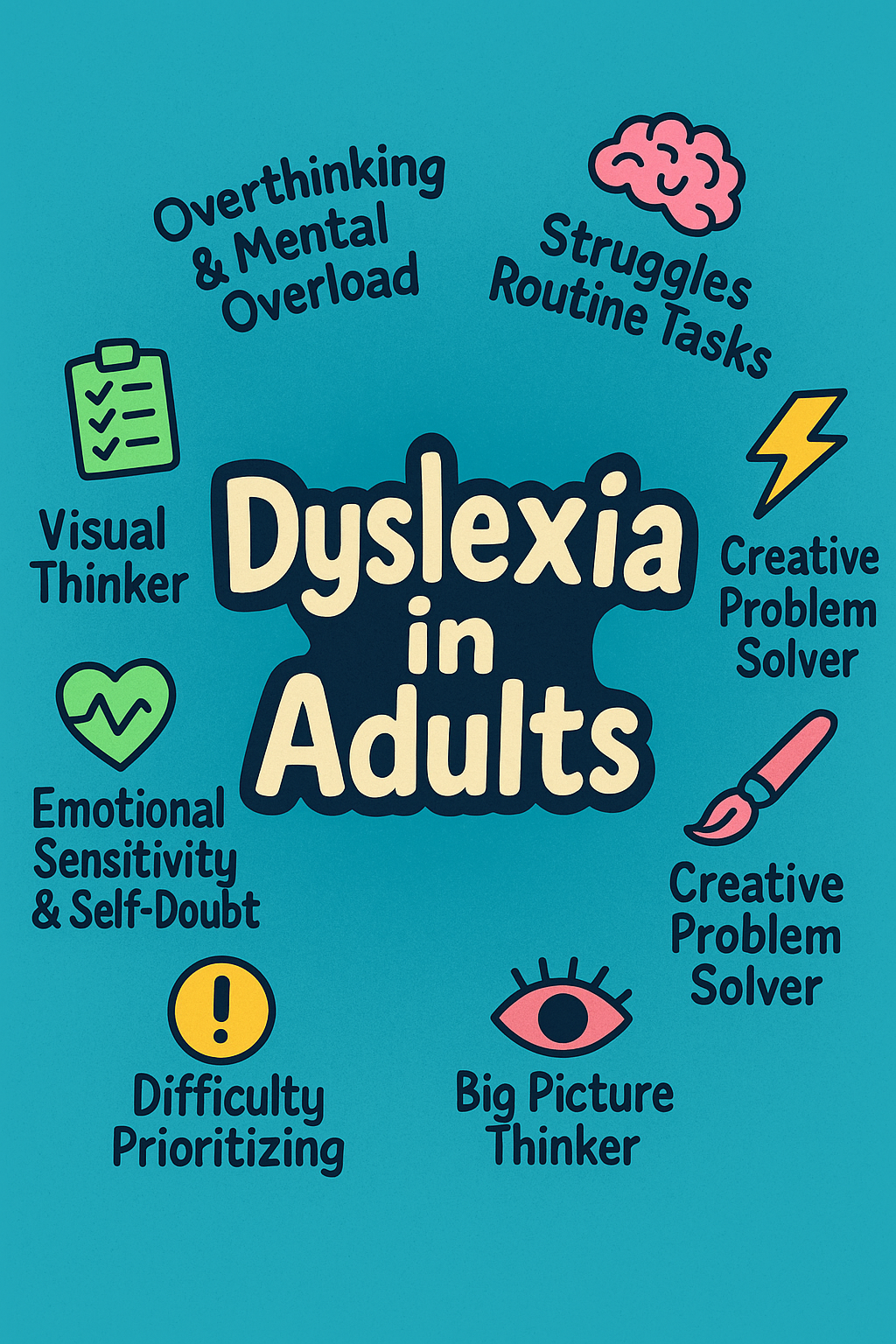
Dyslexia In Adults - Infographic
These common challenges are not always known by people. Feel free to right click and save this image and share it.








